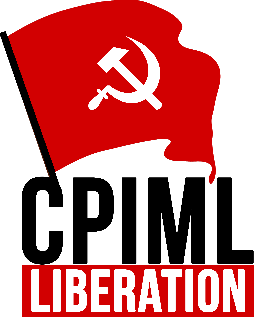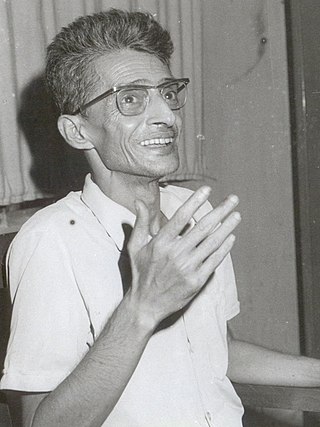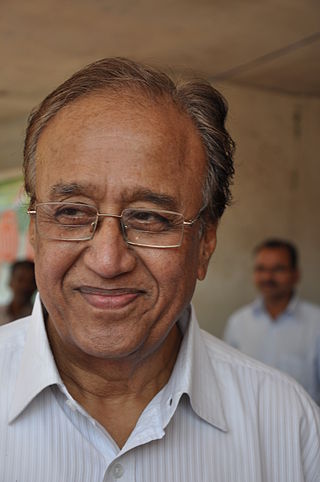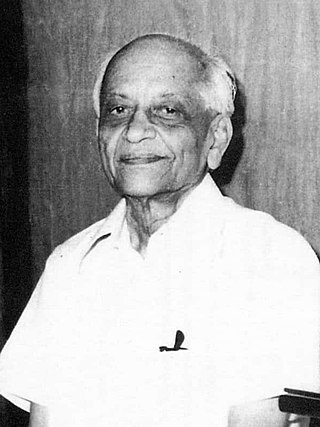Related Research Articles

Elamkulam Manakkal Sankaran Namboodiripad, popularly known by his initials 'E. M. S.', was an Indian communist politician and theorist, who served as the first Chief Minister of Kerala in 1957–1959 and then again in 1967–1969. As a member of the Communist Party of India (CPI), he became the first non-Congress Chief Minister in the Indian republic. In 1964, he led a faction of the CPI that broke away to form the Communist Party of India (Marxist).

The Communist Party of India (Marxist) (abbreviated as CPI(M)) is a communist political party in India. It is the largest communist party in India in terms of membership and electoral seats, and one of the national parties of India. The party was founded through a splitting from the Communist Party of India in 1964 and it quickly became the dominant faction.

The Communist Party of India (CPI) is the oldest communist party in India. The CPI was founded in modern-day Kanpur on 26 December 1925.

Somnath Chatterjee was an Indian politician who was associated with the Communist Party of India (Marxist) for most of his life, though he had been a non affiliated independent during his last decade. He was the Speaker of the Lok Sabha from 2004 to 2009.

Communist Party of India (Marxist–Leninist) Janashakti, abbreviated CPI (ML) Janashakti, was a communist political party in India. In 2013, CPI (ML) Jansakthi merged into CPIML.

The Communist Party of India (Marxist–Leninist) Liberation is a communist political party in India. The party is represented in Bihar and Jharkhand Legislative Assemblies. Since 2023, the party is also a member of the INDIA electoral alliance. In Bihar, party has significant base amongst the Extremely Backward Castes and the Schedule Castes. It was successful in mobilising Upper Backward Caste group such as Koeris in some districts of central Bihar, prior to the rise of Lalu Prasad Yadav. The party faced existential crisis when a large section of its Koeri and Yadav support base was defected to Rashtriya Janata Dal in 1990s. However, the ideological commitment of its cadre protected it from disintegration. It staged a comeback in politics after winning twelve seats in Bihar Legislative Assembly in 2020 and by sending two of its members to Lok Sabha in 2024 Indian general elections.

Harkishan Singh Surjeet was an Indian Communist politician from Punjab, who served as the General Secretary of the Communist Party of India (Marxist) from 1992 to 2005 and was a member of the party's Polit Bureau from 1964 to 2008.

Jyoti Basu was an Indian Marxist theorist, communist activist, and politician. He was one of the most prominent leaders of Communist movement in India. He served as the 6th and longest serving Chief Minister of West Bengal from 1977 to 2000. He was one of the founding members of the Communist Party of India (Marxist). He was the member of Politburo of the party since its formation in 1964 till 2008. He was also the member of West Bengal Legislative Assembly 11 times. In his political career, spanning over seven decades, he was noted to have been the India's longest serving chief minister in an elected democracy, at the time of his resignation. He declined the post of Prime Minister after the 1996 Indian general election after the CPM refused to let him as head a multi-party coalition as would not be able to implement Marxist programs and relinquished the prime ministership to Deve Gowda.

S. Ramachandran Pillai is an Indian politician from Kerala. He is a former Politburo member of the Communist Party of India (Marxist). He was the former General Secretary of All India Kisan Sabha and Currently the vice president of the organisation. He has been imprisoned on many occasions, such as during the Emergency 1975–1976.

Charu Mazumdar, popularly known as CM, was an Indian Communist leader, and founder and General Secretary of the Communist Party of India (Marxist-Leninist). Born into a progressive landlord family in Siliguri in 1918, he became a Communist during the Indian Independence Movement, and later formed the militant Naxalite cause. During this period, he authored the historic accounts of the 1967 Naxalbari uprising. His writings, particularly the Historic Eight Documents, have become part of the ideology of a number of Communism-aligned political parties in India.

Nripen Chakraborty was an Indian Communist politician who served as the Chief minister of Tripura state from 1978 to 1988. Nripen Chakraborty was involved in the Communist movement in India for six decades.

Prakash Karat is an Indian Communist politician. He was the general secretary of the Communist Party of India (Marxist) from 2005 to 2015.
Gurudas Dasgupta was an Indian politician and a leader of the Communist Party of India. In the 1950s and 60s, he held several offices as a student leader. Later he was a member of Rajya Sabha for three terms from 1985 to 2000 and of Lok Sabha for two terms from 2004 to 2014.

Suravaram Sudhakar Reddy is the former General Secretary of the Communist Party of India (CPI) from 2012 to 2019. He was a member of the 12th and 14th Lok Sabha of India. He represented the Nalgonda constituency of Telangana.

Makineni Basavapunnaiah was an Indian Communist leader who was a member of Politburo of the Communist Party of India (Marxist). He was also the editor of the central organ of CPI (M), People's Democracy magazine. He was a member of the Rajya Sabha for 14 years from 3 April 1952 to 2 April 1966.

Mohit Sen was a communist intellectual. He was general secretary of the United Communist Party of India at the time of his death.

Shripad Amrit Dange was an Indian politician who was a founding member of the Communist Party of India (CPI) and a stalwart of Indian trade union movement. During the 20th century, Dange was arrested by the authorities for communist and trade union activities and was jailed for an overall period of 13 years.

Communism in India has existed as a social or political ideology as well as a political movement since at least as early as the 1920s. In its early years, communist ideology was harshly suppressed through legal prohibitions and criminal prosecutions. Eventually, communist parties became ensconced in national party politics, sprouting several political offshoots.
Brij Bihari Pandey is an Indian politician known for being most close associate of Vinod Mishra who founded Communist Party of India (Marxist–Leninist) Liberation. He is a Central Committee member of the Communist Party of India (Marxist-Leninist) Liberation. He was a childhood friend of the founder and leader of the party, Vinod Mishra. He edited the publication Lokyuddh along with Narendra Sah. He is currently the Chairperson of the Central Control Commission of the Party.

In 1964, a major split occurred in the Communist Party of India. The split was the culmination of decades of tensions and factional infighting. When India became independent in 1947, differences arose of how to adapt to the new situation. As relations between the Nehru government and the Soviet Union improved, a faction that sought cooperation with the dominant Indian National Congress emerged within CPI. This tendency was led by S.A. Dange, whose role in the party hierarchy became increasingly controversial. When the Sino-Indian War broke out in 1962 Dange's opponents within CPI were jailed, but when they were released they sought to challenge his leadership. In 1964 the party was finally divided into two, with the left faction forming the Communist Party of India (Marxist). The split had a lot of regional variations. It also impacted other organizations, such as trade union and peasant movements. The split has been studied extensively by scholars, who have sought to analyze the various domestic and international factors involved.
References
- ↑ "Members: Anirudhann" (PDF). www.niyamasabha.org.
- ↑ "CPI Central Leadership". Communist Party of India . Retrieved 26 April 2021.